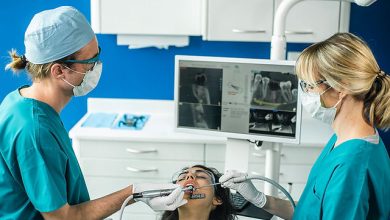The Latest Advancements in Dental Implantology Research

The latest advancements in dental implantology research include digitally designed and milled implant components, computer-guided implant surgery, intraoral dental cameras, and robotic arm assistance. These technological advances have revolutionized the field of implant dentistry, leading to improved success rates and better long-term outcomes.
Researchers are also exploring new materials, such as titanium alloys with ceramic coatings, to enhance the strength and durability of dental implants. However, further long-term studies are needed to fully understand the limitations and potential of these advancements. Stay up-to-date with the latest research and technological innovations in dental implants to benefit from this exciting field of dentistry.

Credit: leeorthotexas.com
Digging Into The Latest Technological Innovations
The latest advancements in dental implantology research have brought about exciting technological innovations in the field. One such advancement is the use of digitally designed and milled implant components and restorations. This technology allows for precise customization of dental implants, leading to better fitting and more natural-looking results.
In addition to digitally designed and milled implant components, computer-guided implant surgery has also emerged as a significant advancement. This technology uses computer imaging to create a detailed surgical plan, leading to more accurate and successful implant placement.
Furthermore, the use of intraoral dental cameras has revolutionized implantology. These cameras provide clear, detailed images of the patient’s oral cavity, allowing for precise implant placement and monitoring.
Another innovative technology in dental implantology is robotic arm assistance. This technology assists the dentist in performing intricate implant surgeries with utmost precision and efficiency.
Exploring The Future Of Teeth Replacement
The future of teeth replacement in dental implantology research is filled with promising advancements. Researchers have been exploring new materials for dental implants to enhance their strength and durability. One such advancement is the use of titanium alloys combined with ceramic coatings, which has shown promising results in improving osseointegration – the fusion between implant and bone. This enhancement leads to better long-term success rates for dental implants.
In addition to exploring new materials, advancements in digital technology have also played a significant role in teeth replacement. Digitally designed and milled implant components and restorations, computer-guided implant surgery, intraoral dental cameras, and robotic arm assistance have all contributed to more precise and efficient dental implant procedures. These technologies aid in the planning, placement, and monitoring of dental implants, resulting in better outcomes for patients. Overall, the future of teeth replacement looks promising with ongoing advancements in materials and technology in the field of dental implantology.
| New Materials for Dental Implants | Titanium Alloys Combined with Ceramic Coatings | Enhancing Osseointegration for Better Long-Term Success Rates |
Recent Advances In Dental Implants
The field of dental implantology has witnessed significant advancements in recent years, leading to improved success rates and patient outcomes. One area of research that has shown promising results is the surface modifications of dental implants. These modifications enhance the osseointegration process, the fusion between the implant and the bone, resulting in better long-term success rates.
Another recent advance is immediate loading, which allows for the placement of a temporary crown or bridge on the implant on the same day as the surgery. This not only reduces treatment time but also provides aesthetic and functional benefits for the patient.
Short implants are another area of focus in dental implantology research. These implants are specially designed for patients with limited bone height, allowing them to receive dental implants and restore their smiles without the need for more extensive bone grafting procedures.
Sinus lifting is a surgical procedure that involves raising the sinus membrane to create space for the placement of dental implants in the posterior upper jaw. This technique has been refined over the years, leading to improved success rates and predictable outcomes.
Lastly, custom implants are gaining interest in the field of dental implantology. These implants are tailored to the individual patient’s anatomy, ensuring a precise fit and optimal esthetics.
In conclusion, recent advancements in dental implantology research have focused on surface modifications, immediate loading, short implants, sinus lifting, and custom implants. These innovations have improved the success rates and patient experience in dental implant treatments.
Frequently Asked Questions On The Latest Advancements In Dental Implantology Research.
What Is The Newest Technology For Dental Implants?
The newest technology for dental implants includes digitally designed and milled implant components, computer-guided implant surgery, intraoral dental cameras, and robotic arm assistance. These advancements have improved the accuracy and efficiency of dental implant procedures.
What Are The Technological Advances In Implantology?
Technological advances in implantology include three-dimensional imaging, implant-planning software, computer-aided-design/computer-aided-manufacturing (CAD/CAM) technology, and computer-guided and navigated implant surgery. These developments have computerized the field of implant-dentistry.
What Is The Future Of Teeth Replacement?
The future of teeth replacement involves advancements in dental implant technology. Researchers are exploring new materials, such as titanium alloys with ceramic coatings, to enhance the strength and durability of implants. These advancements improve the fusion between the implant and bone, leading to better long-term success rates.
What Are The Latest Advancements In Dental Implantology Research?
Recent advancements in dental implantology research include three-dimensional imaging, computer-guided implant surgery, and computer-aided design/manufacturing (CAD/CAM) technology. These advancements have led to improved success rates and automation in implant dentistry.
Conclusion
The field of dental implantology has witnessed remarkable advancements in recent years. From the use of digital impressions and computer-guided implant surgery to the exploration of new materials for enhanced strength and durability, these advancements have revolutionized the way dental implants are designed and placed.
Moreover, ongoing research continues to push the boundaries of implant technology, promising even more exciting developments in the future. Stay informed and keep up with the latest advancements in dental implants to provide the best possible care for your patients.


